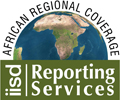|
 The
African Union (AU) is the principal organization for the
promotion of socioeconomic integration across the continent.
It includes 53 African countries as member states, while
Morocco has special status. The Heads of State and
Government of the Organization of African Unity called for
its establishment in the Sirte Declaration on 9 September
1999, as a means to accelerate integration, so that Africa
could play a significant role in the global economy, and to
address shared social, economic and political problems. Its
objectives include: achieving greater unity and solidarity
between African countries and the peoples of Africa;
promoting and defending common African positions on issues;
encouraging international cooperation; establishing enabling
conditions for the continent to play its rightful role in
the global economy and in international negotiations;
promoting sustainable development and integration of African
economies; and advancing the continent’s development through
research in all fields, particularly science and technology
(S&T). The
African Union (AU) is the principal organization for the
promotion of socioeconomic integration across the continent.
It includes 53 African countries as member states, while
Morocco has special status. The Heads of State and
Government of the Organization of African Unity called for
its establishment in the Sirte Declaration on 9 September
1999, as a means to accelerate integration, so that Africa
could play a significant role in the global economy, and to
address shared social, economic and political problems. Its
objectives include: achieving greater unity and solidarity
between African countries and the peoples of Africa;
promoting and defending common African positions on issues;
encouraging international cooperation; establishing enabling
conditions for the continent to play its rightful role in
the global economy and in international negotiations;
promoting sustainable development and integration of African
economies; and advancing the continent’s development through
research in all fields, particularly science and technology
(S&T).
The
principle organs of the AU include the: Assembly; Executive
Council; Commission; Permanent Representatives Committee;
Peace and Security Council; Pan-African Parliament;
Economic, Social and Cultural Council; Court of Justice;
Financial Institutions; and Specialized Technical
Committees, which includes the Committee on Industry,
Science and Technology, Energy, Natural Resources and
Environment. The current AU chair is the President of the
Ghana, John Kufuor.
ASSEMBLY:
The AU Assembly is composed of the Heads of State and
Government of AU member states or their accredited
representatives. The Assembly acts as the supreme organ of
the AU and is mandated to: determine the common policies of
the Union; consider and take decisions on reports and
recommendations from other AU bodies; consider requests for
membership of the AU; establish any organ of the Union;
monitor the implementation of AU policies and decisions as
well ensure compliance by all member states; adopt the AU
budget; give directives to the Executive Council on the
management of conflicts, war and other emergency situations
and the restoration of peace; appoint and terminate the
appointment of judges of the Court of Justice; and appoint
the Chairperson of the Commission, his or her deputies and
Commissioners, and determine their functions and terms of
office.
EXECUTIVE
COUNCIL:
The Executive Council of Ministers of the AU is composed of
the Ministers of Foreign Affairs or other ministers or
authorities designated by member states. The Executive
Council meets at least twice a year in ordinary session. It
can also meet in an extraordinary session at the request of
any member state and upon approval by two-thirds of all
member states. The Executive Council is mandated to
coordinate and take decisions on policies in areas of common
interest to the member states, including: foreign trade;
energy, industry and mineral resources; food, agricultural
and animal resources, livestock production and forestry;
water resources and irrigation; environmental protection,
humanitarian action and disaster response and relief;
transport and communications; insurance; education, culture,
health and human resources development; S&T; nationality,
residency and immigration matters; and social security.
AU
COMMISSION:
The Commission is responsible for the day-to-day management
of the AU. Among other functions, it: represents the AU in
intergovernmental forums; elaborates draft common positions;
prepares strategic plans and studies for consideration by
the Executive Council; and promotes and harmonizes the
programmes and policies of the AU and Regional Economic
Communities (RECs). The current chair of the AU Commission
is Alpha Omar Konare (Mali). |




